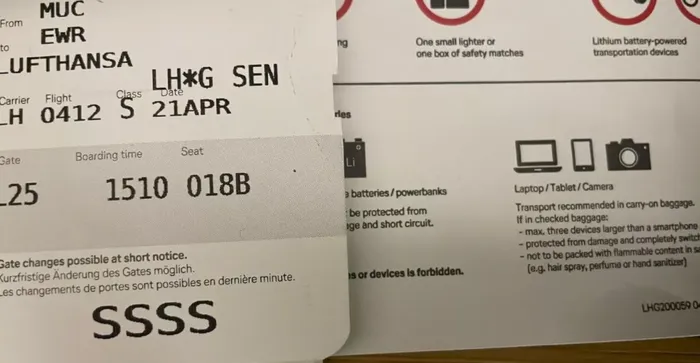Travelling to the US? This code on your boarding pass could delay your trip

This is what the SSSS code means on your US boarding pass.
Image: X
Next time you're preparing for a trip to the United States, take a close look at your boarding pass.
If you spot “SSSS” printed in the bottom corner, you might be in for a longer wait at airport security.
The acronym stands for “Secondary Security Screening Selection”, a designation used by the Transportation Security Administration (TSA) to identify passengers selected for additional security checks
This code can appear on both printed and digital boarding passes and only applies to flights to and from the United States.
While some passengers are chosen randomly, others may find themselves repeatedly flagged based on travel history, destination, or security assessments.
Unfortunately, having this code can significantly impact your journey, requiring you to undergo a more thorough screening process before being allowed to board.
One passenger recounted their experience with the SSSS code on YouTube:
What happens if you see ‘SSSS’ on your boarding pass?
If your boarding pass is marked with SSSS, you can expect an enhanced security screening, which may take considerably longer than the standard procedure.
This process can include:
- A full-body pat-down conducted by a TSA officer
- An additional metal-detecting wand scan
- Explosive-detection swabs applied to your baggage, hands, and in some cases, your feet
- A manual inspection of all carry-on luggage, where every pocket and lining is examined for contraband
- To turn on and present all electronic devices for individual inspection
- Questioning by TSA officers about your travel plans, reason for your trip, and whether you packed your own bags
- Some travellers may also undergo an even more detailed search, which could include additional screening measures.
It’s important to know that if privacy is a concern, passengers have the right to request a private screening room for these procedures.
Why are passengers selected for SSSS?
There is no official explanation as to why certain passengers are selected for SSSS screening, but some common factors include:
- Last-minute bookings or one-way tickets
- International travel to high-risk destinations
- Frequent travel to certain countries that have been flagged for additional security
- Mismatched passport or ticket details
- Being on a watchlist or flagged by security databases
Although selection is often random, some travellers report being routinely picked, leading to speculation that previous SSSS screenings may increase the likelihood of future selections.
How to prepare if you get the SSSS code
Because there is no set time limit for completing the SSSS screening, it’s important to arrive at the airport early. These additional security checks can be time-consuming and may delay your journey.
If you believe you are being repeatedly selected without reason, you can apply for the TSA’s Trusted Traveller programmes, such as “Global Entry” or “TSA PreCheck”, which may help reduce the likelihood of future SSSS selections.
IOL Travel
Get your news on the go, click here to join the IOL News WhatsApp channel
Related Topics: